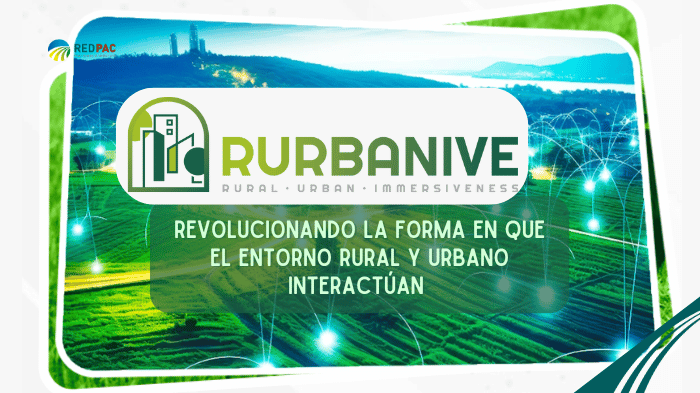
26 de March de 2024
Dinamización rural
Innovación
The project seeks to address regional inequalities by creating technical and economic solutions that lead to new, positive governance frameworks and policy interventions for rural communities.
- The project will develop six "rural-urban facilitators" in six areas and a virtual "community store" to create community and generate synergies between rural and urban environments.
- It will operate between 2024 and 2027 to establish a new innovation framework based on technical and social innovations.
Despite the divergence in the focus of rural and urban policies, both environments are part of the same ecosystem that coexists and aspires to understand and support each other. With this in mind, RURBANIVE , a Horizon Europe project, was launched in February 2024. with 17 partners from 8 countries, co-financed by the European Union, to improve the lives of rural communities through technological innovation . Spain is part of this project.
The project will develop six "rural-urban enablers": various technological resources to promote two-way synergies between the urban and rural environments and economic well-being.
In addition, it will develop a digital space, the 'Community Store' , where it will integrate facilitators with the user community to focus on policies connecting rural-urban communities .
This transformative approach is based on the idea of revolutionizing the dynamics of rural and urban communities and responding to the challenges of the economic crises and the impacts of the COVID-19 pandemic. Ultimately, it is about addressing regional inequalities , especially in rural areas.
Goals
The project bases its actions on a series of objectives and actions:
- Social innovation and research: thanks to "Rural-Urban Co-creation Labs ," synergies between the two environments will be enhanced through participatory approaches and an innovation framework. There are seven labs, one of which is located in Burgos, Spain.
- Well-being and economy: supported by facilitators both physically and virtually.
- Social Connectivity : This will develop rural-urban immersion for social connectivity in an inclusive environment. Immersive technologies will be used to revolutionize the interaction between rural and urban environments. This will work with extended reality (XR) innovations in three applications used by all labs, and will support the experimentation and visualization of hypothetical scenarios.
- Policy recommendations: The project will foster virtual interaction and provide a space for rural/urban dialogue and collaboration.
- Business models: to scale and maximize impact, paving the way for sustainable and resilient rural-urban communities.
Rural-urban facilitators
The innovation facilitators that will create these urban-rural synergies are the following:
- Circular Bioeconomy: To create nature-based solutions and bridge the water-soil-biodiversity divide, establish circular value chains and nutrient exchanges, entrepreneurs, and stakeholders between rural areas and cities.
- Ecosystem and biodiversity restoration: restoration and valorization to collaborate, rather than compete, with local resources.
- Improving logistics and shortening value chains: To promote a new paradigm of shorter value chains, as well as increase the social awareness of stakeholders through the platform. The platform should function as a hub for training and awareness-raising activities.
- User participation, empowerment, community, and territorial awareness: enabling an ecosystem of towns with entrepreneurial opportunities through research mapping and attracting businesses, stakeholders, and SMEs.
- Access to culture, landscape, and heritage: Using cognitive computing systems (human-brain-mimicking AI) to explore why some rural cultural landscapes are more visited and why.
- Augmented Mobility: To design and test dispatching algorithms (for the efficient allocation of computing resources) and their current management.
Ultimately, it's about Rural-Urban Co-Creation Labs leveraging dialogue, their specific geographic circumstances, and contexts, and delivering results to create technical and economic solutions that lead to positive new governance frameworks and policy interventions for rural communities.
The 'Community Store' will be a space for interaction between users of both media to create solutions based on dialogue and cooperation.
Partners
The European RURBANIVE project was officially launched on February 15 and 16, 2024, in Athens, Greece, along with its 17 partners from eight countries. The consortium is coordinated by the Institute of Communication and Information Systems at the University of Athens ( ICCS ), and consists of the Agricultural University of Athens ( AUA ), the CARTIF Foundation , the Swedish Research Institute RISE , Foodscale Hub ( FSH ), the European Innovation Partnership for Local Development ( AEIDL ), the Czech University of Life Sciences in Prague ( CZU ), Alchemia-nova Research and Innovation ( ANRI ), AgriFood Lithuania ( AFL ), IMERYS , the Lisbon Council for Economic Competitiveness and Social Renewal ( LC ), the Municipality of Trikala ( e-trikala ), the Kedainiai District Municipality ( KDM ), the South Aegean Region ( SAR ), the Innovation Campus lemgo ( ICL ), the Partnership for Rural Europe ( PREPARE ) and BioBASE .









